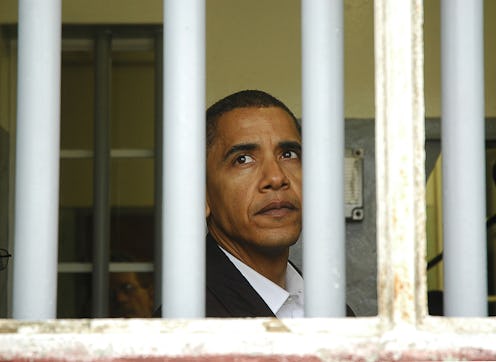News
President Obama's Solitary Ban Is Crucial
Across America there are children who live in solitary confinement for 22 to 24 hours a day, too often locked away without books, writing utensils, or any means of mental stimulation. These young people spend months or years in isolation because they were tried for crimes as adults and put in isolation to either punish them or protect them from adult prisoners. The kids grow up alone, without education or social interaction, and yet we expect them to be reformed adults upon release. Thankfully, President Obama is banning solitary confinement for juveniles because he recognizes the enormous mental toll isolation can have on a developing mind. This is necessary and long overdue.
In an op-ed for The Washington Post, Obama told the story of Kalief Browder, a man sent to Rikers Island Prison Complex at age 16 in 2010. Browder was locked up after being accused of stealing a backpack, and spent two years in solitary confinement before he was released having never stood trial. In the summer of 2015, Browder committed suicide. He died the same summer that Obama called for Attorney General Loretta Lynch and the Justice Department to review whether or not solitary confinement is overused in American prisons. The Justice Department suggested the use solitary confinement be severely restricted because of the damage isolation can do to a person.
Human Rights Watch and the American Civil Liberties Union (ACLU) found that solitary confinement can have psychological and physical damage on anyone, but especially on children and people with mental illnesses. There are cases of mentally ill kids held in solitary confinement, where their conditions are exacerbated by their isolation and aren't properly treated.
The ACLU report said that youth in solitary confinement often don't have access to the programs other inmates are offered, including education and exercise programs, which stunts their mental and physical health. Many prisoners have the opportunity to earn their GED or work within their prison, giving them potentially useful skills and something to work toward. But young people in solitary confinement aren't given this chance, so it's no surprise so many of them have trouble assimilating back into the free world. Rafael, who was held in isolation at 15 and only gave his first name, described his experience to the ACLU:
It changes you; It hurts you; It makes you depressed; It makes you want to act out; It makes you angry. It's no rehabilitation.
And shouldn't rehabilitation be the purpose of imprisonment, especially for minors whose minds haven't even fully developed? Obama pointed out that the practice of solitary confinement is inherently un-American:
The United States is a nation of second chances, but the experience of solitary confinement too often undercuts that second chance. Those who do make it out often have trouble holding down jobs, reuniting with family and becoming productive members of society.
If America is truly a nation of second chances, it needs to live up to that title, and the first step is to get children out of solitary confinement. Kids shouldn't be in prisons with adults in the first place, and completely removing them from all social situations can't be the answer. We can create more juvenile detention facilities or implement varied means of segregation that don't include complete isolation. We can change our philosophy from detention to rehabilitation, and focus on treating the mentally ill rather than punishing them. We have options, and Obama and the Justice Department should be applauded for seeing the injustice in isolation, and for starting to take necessary steps towards fixing it.
